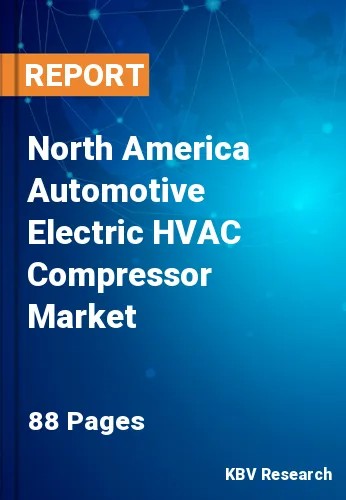The North America Automotive Electric HVAC Compressor Market would witness market growth of 19% CAGR during the forecast period (2021-2027).
An electric compressor refers to an external component of the vehicle engine. Basically, it performs dual tasks which include cooling the cabin and the battery pack and preventing the overheating of the battery so as to minimize the possibilities of vehicle breakdown. An electric compressor is known for its low number of mechanical parts and therefore helps in achieving soundless and clearer operations because of the lower oil carryover. Due to these benefits, the overall efficiency of the vehicle is increased, provided that electric compressors are not dependent on the vehicle engine, hence boosting the demand for these compressors.
Existing technologies and performances of hydrogen compression for stationary and automotive applications are the catalysts for the growth of the automotive Ac compressor market. Hydrogen is playing a crucial role in developing vehicles emission-less and helps in the sustainable development of the global automotive industry. This is apparent since hydrogen is one of the highly available elements and virtually presents everywhere, hence becoming an abundant source of energy.
The advent of new electrically powered AC compressors has fueled the incorporation of AC systems in vehicles by decreasing the load on engines and streamlining the remote operation of the vehicles’ HVAC so that when the driver or passenger comes inside the vehicle, the temperature would be already set to the desired comfort level. Demand for these superior automotive electric HVAC compressors would surge substantially in the next few years.
Moreover, the customers in this region are witnessing a constant surge in their disposable income, which would encourage them to choose the vehicle with advanced features. Furthermore, these customers prefer to spend for extra comfort in their vehicles and thus, manufacturers in the automobile industry have made AC a traditional offering in the majority of their vehicles model so as to meet these demands.
The US market dominated the North America Light Commercial Vehicle (LCV) Automotive Electric HVAC Compressor Market by Country 2020, and would continue to be a dominant market till 2027; thereby, achieving a market value of $1,021.8 million by 2027. The Canada market is experiencing a CAGR of 20.8% during (2021 - 2027). Additionally, The Mexico market would witness a CAGR of 19.7% during (2021 - 2027).
Based on Vehicle Type, the market is segmented into Passenger Vehicle, Light Commercial Vehicle (LCV), Heavy Commercial Vehicle (HCV) and Others. Based on Drivetrain, the market is segmented into Hybrid Electric Vehicles (HEV), Plug-in Hybrid Electric Vehicles (PHEV) and Battery Electric Vehicles (BEV). Based on Cooling Capacity, the market is segmented into 20-40 CC, Less Than 20 CC, 40-60 CC and Others. Based on countries, the market is segmented into U.S., Mexico, Canada, and Rest of North America.
Free Valuable Insights: The Global Automotive Electric HVAC Compressor Market is Estimated to Reach USD 30.4 Billion by 2027 at a CAGR of 19.4%
The market research report covers the analysis of key stake holders of the market. Key companies profiled in the report include Denso Corporation, Toyota Industries Corporation, Valeo SA, Aptiv PLC, Panasonic Corporation, Brose Fahrzeugteile SE & Co. KG, BorgWarner, Inc., Hanon Systems (Hahn & Co. Auto Holdings Co., Ltd.), Mahle GmbH (Mahle Stiftung GmbH), and Sanden Holdings Corporation.
By Vehicle Type
By Drivetrain
By Cooling Capacity
By Country
Our team of dedicated experts can provide you with attractive expansion opportunities for your business.

